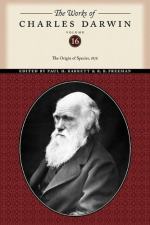state. In many cases we do not know what the
aboriginal stock was, and so could not tell whether
or not nearly perfect reversion had ensued. It
would be quite necessary, in order to prevent the
effects of intercrossing, that only a single variety
should be turned loose in its new home. Nevertheless,
as our varieties certainly do occasionally revert
in some of their characters to ancestral forms, it
seems to me not improbable, that if we could succeed
in naturalising, or were to cultivate, during many
generations, the several races, for instance, of the
cabbage, in very poor soil (in which case, however,
some effect would have to be attributed to the direct
action of the poor soil), that they would to a large
extent, or even wholly, revert to the wild aboriginal
stock. Whether or not the experiment would succeed,
is not of great importance for our line of argument;
for by the experiment itself the conditions of life
are changed. If it could be shown that our domestic
varieties manifested a strong tendency to reversion,—that
is, to lose their acquired characters, whilst kept
under unchanged conditions, and whilst kept in a considerable
body, so that free intercrossing might check, by blending
together, any slight deviations of structure, in such
case, I grant that we could deduce nothing from domestic
varieties in regard to species. But there is not
a shadow of evidence in favour of this view:
to assert that we could not breed our cart and race-horses,
long and short-horned cattle, and poultry of various
breeds, and esculent vegetables, for an almost infinite
number of generations, would be opposed to all experience.
I may add, that when under nature the conditions of
life do change, variations and reversions of character
probably do occur; but natural selection, as will
hereafter be explained, will determine how far the
new characters thus arising shall be preserved.
When we look to the hereditary varieties or races
of our domestic animals and plants, and compare them
with species closely allied together, we generally
perceive in each domestic race, as already remarked,
less uniformity of character than in true species.
Domestic races of the same species, also, often have
a somewhat monstrous character; by which I mean, that,
although differing from each other, and from the other
species of the same genus, in several trifling respects,
they often differ in an extreme degree in some one
part, both when compared one with another, and more
especially when compared with all the species in nature
to which they are nearest allied. With these
exceptions (and with that of the perfect fertility
of varieties when crossed,—a subject hereafter
to be discussed), domestic races of the same species
differ from each other in the same manner as, only
in most cases in a lesser degree than, do closely-allied
species of the same genus in a state of nature.
I think this must be admitted, when we find that there
are hardly any domestic races, either amongst animals




